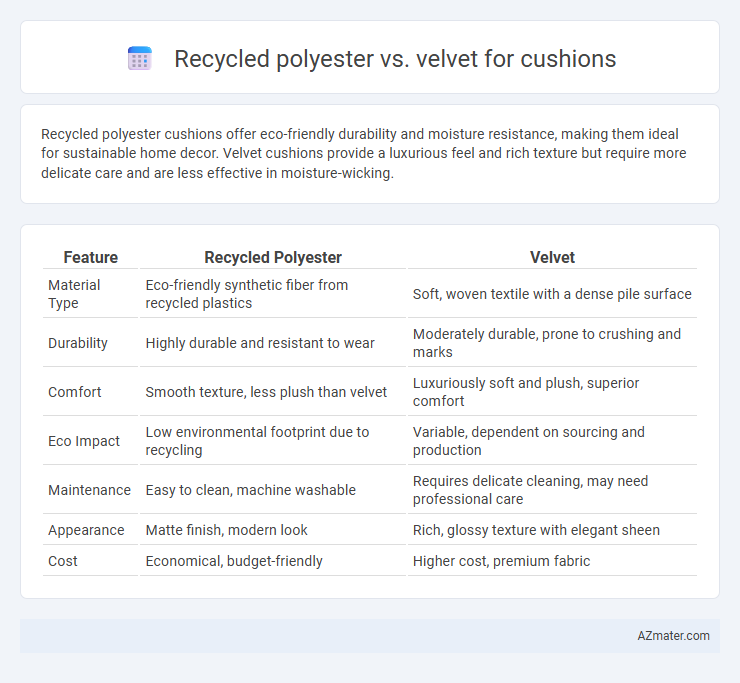Recycled polyester cushions offer eco-friendly durability and moisture resistance, making them ideal for sustainable home decor. Velvet cushions provide a luxurious feel and rich texture but require more delicate care and are less effective in moisture-wicking.
Table of Comparison
| Feature | Recycled Polyester | Velvet |
|---|---|---|
| Material Type | Eco-friendly synthetic fiber from recycled plastics | Soft, woven textile with a dense pile surface |
| Durability | Highly durable and resistant to wear | Moderately durable, prone to crushing and marks |
| Comfort | Smooth texture, less plush than velvet | Luxuriously soft and plush, superior comfort |
| Eco Impact | Low environmental footprint due to recycling | Variable, dependent on sourcing and production |
| Maintenance | Easy to clean, machine washable | Requires delicate cleaning, may need professional care |
| Appearance | Matte finish, modern look | Rich, glossy texture with elegant sheen |
| Cost | Economical, budget-friendly | Higher cost, premium fabric |
Introduction to Cushion Fabric Choices
Recycled polyester offers an eco-friendly, durable, and stain-resistant option for cushion fabrics, making it ideal for sustainable interior design. Velvet provides a luxurious texture with a rich, soft feel, enhancing comfort and aesthetic appeal in home decor. Choosing between recycled polyester and velvet depends on the balance of environmental impact, durability, and tactile experience desired for cushions.
What Is Recycled Polyester?
Recycled polyester is a sustainable fabric made from repurposed plastic bottles and textile waste, reducing environmental impact compared to virgin polyester. It offers durability, moisture resistance, and easy maintenance, making it a practical choice for cushion covers. Velvet, while luxurious and soft with a dense pile that provides comfort, typically lacks the eco-friendly attributes and water-resistant properties found in recycled polyester.
What Is Velvet?
Velvet is a luxurious fabric characterized by its dense pile of evenly cut fibers, giving it a soft and smooth texture often used for cushions to provide a rich, tactile experience. Unlike recycled polyester, which is made from repurposed plastic materials emphasizing sustainability and durability, velvet typically comes from natural fibers like silk or cotton, offering a more classic, elegant feel. The choice between recycled polyester and velvet for cushions depends on desired aesthetics, eco-friendliness, and comfort preferences.
Environmental Impact Comparison
Recycled polyester cushions significantly reduce environmental impact by utilizing post-consumer plastic waste and decreasing reliance on virgin petroleum resources, which lowers greenhouse gas emissions and landfill accumulation. Velvet cushions, often made from natural fibers like cotton or synthetic fibers such as polyester, typically require more water, energy, and chemical-intensive processes during production, increasing their overall ecological footprint. Choosing recycled polyester supports circular economy principles and mitigates pollution, whereas traditional velvet may contribute more substantially to resource depletion and environmental degradation.
Durability and Longevity
Recycled polyester cushions offer exceptional durability with high resistance to stretching, shrinking, and abrasion, making them ideal for long-term use in high-traffic areas. Velvet cushions provide a luxurious feel but tend to wear faster, showing signs of crushing and color fading over time when subjected to frequent use. Choosing recycled polyester enhances longevity and maintenance ease, ensuring cushions maintain their appearance and structural integrity longer than velvet alternatives.
Comfort and Texture Differences
Recycled polyester cushions offer a smooth, lightweight texture with good durability and moisture resistance, making them ideal for environments prone to spills or moisture. Velvet cushions feature a plush, soft surface with a luxurious feel, providing superior comfort and a tactile richness that is often preferred for cozy, elegant settings. While recycled polyester prioritizes sustainability and resilience, velvet excels in softness and aesthetic appeal, influencing the overall tactile experience of cushions.
Aesthetic Appeal and Color Options
Recycled polyester cushions offer a sleek, modern aesthetic with a wide range of vibrant, fade-resistant color options that maintain their brightness over time. Velvet cushions provide a rich, luxurious texture with deep, saturated hues that enhance warmth and sophistication in any space. Both materials cater to diverse design preferences, with recycled polyester excelling in sustainability and versatility, while velvet stands out for its plush elegance and timeless appeal.
Maintenance and Cleaning
Recycled polyester cushions offer easy maintenance due to their resistance to stains and quick-drying properties, requiring simple spot cleaning with mild detergent and water. Velvet cushions demand more delicate care, as their soft pile can trap dust and dirt, necessitating gentle vacuuming and professional cleaning to avoid damage. Choosing recycled polyester is ideal for low-maintenance settings, while velvet suits environments where careful, periodic upkeep is manageable.
Cost Comparison
Recycled polyester cushions generally cost less than velvet cushions due to lower raw material expenses and simpler manufacturing processes. Velvet, made from silk, cotton, or synthetic fibers, involves intricate weaving techniques that increase production costs, making it a premium option. Choosing recycled polyester offers budget-friendly durability and eco-conscious appeal, while velvet prioritizes luxury aesthetics at a higher price point.
Which Fabric Is Best for Your Cushions?
Recycled polyester offers durability, moisture resistance, and eco-friendly benefits, making it an ideal choice for cushions in high-traffic areas or outdoor settings. Velvet provides a luxurious texture and rich appearance, perfect for decorative cushions in low-traffic or indoor environments where comfort and style are priorities. Choosing between recycled polyester and velvet depends on your cushion's intended use, balancing durability with aesthetic appeal.

Infographic: Recycled polyester vs Velvet for Cushion
 azmater.com
azmater.com